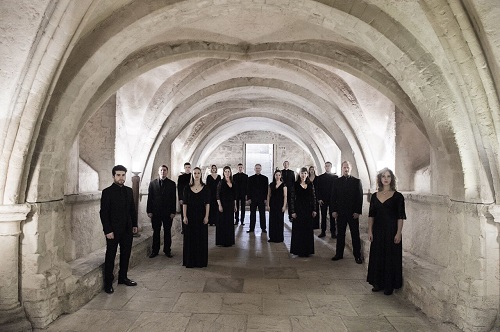
 United Kingdom Three Choirs Festival [2]: Tenebrae / Nigel Short (conductor). Hereford Cathedral, 30.7.2018. (JQ)
United Kingdom Three Choirs Festival [2]: Tenebrae / Nigel Short (conductor). Hereford Cathedral, 30.7.2018. (JQ)

Elgar – They are at rest
Tavener – Song for Athene
Gurney – Since I believe in God
Torsten Rasch – A Foreign Field Psalm
Judith Bingham – A Walk with Ivor Gurney
Howells – Take Him, Earth, for Cherishing
Vaughan Williams – Valiant-for-Truth
Parry – Songs of Farewell
Schoenberg – Friede auf Erden
Tenebrae’s keenly-anticipated afternoon concert at the Three Choirs Festival pursued the theme of Death and Consolation. So carefully and thoughtfully was the programme designed that one can only do it justice by reporting what we heard as a sequence.
The Dean of Hereford came onto the empty stage and made the usual introductory remarks including – thank goodness – a request that the music should be heard as an unbroken sequence with applause deferred until the end of each half. As he walked off, I expected, as I’m sure did everyone else, that the singers would file onto the platform to begin, but Nigel Short had other ideas. With exquisite sensitivity, the strains of Elgar’s gentle little anthem, They are at rest floated into the space of the cathedral from behind the audience. The singers were positioned somewhere at the south-east end of the cathedral. (For the Festival, the seating is all turned round to face the platform at the west end of the nave.) The effect was magical. Then, in an unadvertised addition to the programme, a lone bass voice intoned the plainchant ‘Requiem aeternam dona eis, Domine’. As the chant progressed, the basses processed slowly down the south aisle and took their place on the stage. From there they began the soft drone that underpins Sir John Tavener’s Song for Athene. The remaining members of Tenebrae then processed down the south aisle, led by Nigel Short, pausing each time they sang. They timed their arrival on the stage to coincide with the piece’s climax. This was a most imaginative way to open the programme.
Ivor Gurney wrote scarcely any choral music, even though his initial musical training was as a chorister and pupil of Sir Herbert Brewer at Gloucester Cathedral. I know of one psalm chant and another anthem besides Since I believe in God, which he wrote in 1925. Long unknown, Since I believe in God was, I understand, discovered by the composer Philip Lancaster, who edited it. The piece received its first modern performance from Adrian Partington and the Choir of Gloucester Cathedral as recently as 2012 and they went on to make the first recording two years later (review). It has now also been included in a new album by Tenebrae, of which more in a moment. Gurney’s anthem is a setting of words by Robert Bridges. The music is very intense, featuring harmonies that are frequently probing. Today’s performance was expertly shaded and the textures were rendered with fine clarity, which is what a successful performance of this notable work needs.
The music of Torsten Rasch has had significant exposure at the Three Choirs Festival in recent years; indeed, I think I’m right in saying that at least one piece by him has been performed at every festival since 2013. His large scale choral/orchestral work, A Foreign Field received its world premiere at the 2014 Festival (review). I struggled with that work at a first hearing. Subsequently, I’ve had access to a radio recording of the German premiere but have still not found the music any easier. Prior to setting out for Hereford, I looked out my review of that 2014 premiere and found that I had said this: “Nowhere were [the Festival Chorus] more successful than in what was, for me, the highlight of the piece. This is the extended setting of Psalm 91for unaccompanied choir, sometimes divided into five or six parts. This closes Part I. The choir sang this superbly….I could easily see this fine, eloquent music evolving into a separate anthem; in that format I think it would be very successful.” Today, not having read my programme notes with sufficient care, I was expecting to hear the same music again but such was not the case. The music performed by Tenebrae was a much tougher proposition, far less consonant, than I remembered from Worcester four years ago. The composer explained, in a programme note, that when he composed A Foreign Field, the psalm was the first music to be written. However, as the work as a whole evolved he came to feel that the psalm music didn’t fit too well so he re-wrote it and the revised version was what I heard in 2014. Obviously, one must defer to the composer’s vision of his music but, drawing on memory, I can’t help feeling that his second thoughts were preferable and I wonder how wide a currency this somewhat thorny independent setting will have.
Judith Bingham’s A Walk with Ivor Gurney is a Tenebrae commission from 2013. In this work Bingham sought to bring together the Gloucestershire of Gurney’s time and its ancient past by assembling a text drawn from Gurneys own poetry and some Latin inscriptions found on Roman tombs in the county. The work includes a substantial and demanding part for a solo mezzo. This music was conceived for Dame Sarah Connolly but here the role was taken, with great assurance and musicianship, by Martha McLorinan, a member of Tenebrae. For this piece the tenors and basses went offstage to sing from the side, invisible to most of the audience while the sopranos and altos remained onstage. The writing featured the imaginative choral textures which I’ve experienced before in this composer’s music but I think I need greater familiarity with the piece before commenting further. Happily, Tenebrae have just recorded it on the album to which I referred earlier. The CD set, entitled A Walk with Ivor Gurney, is scheduled for release in October (Signum Classics SIGCD557).
To close the first half, we heard Herbert Howells’ wonderful anthem, Take Him, Earth, for Cherishing. In his valuable programme notes, Gwilym Bowen justly described the piece as a “matchless motet…. surely one of the pinnacles of the choral repertoire of the 20th century.” I wouldn’t disagree and the superb performance by Nigel Short and his singers fully supported Mr Bowen’s judgement. The rich, chromatic harmonies and long, achingly expressive lines made their full impact here.
The festival is recognising handsomely the centenary of the death of Sir Hubert Parry and there could be no better way of paying tribute than through his masterly Songs of Farewell. The more I hear these six wonderful part songs the more I think they represent the pinnacle of Parry’s achievement. For one thing, the texts are so appropriate and so discerningly chosen. But what marks these songs out particularly is that Parry’s music displays not only great technical mastery but also a level of expressiveness that, in my experience, is unmatched in his output. Here we can experience, in music of great humanity, dignity and feeling, his extreme sadness that Britain had come to war with Germany, a country whose culture he greatly admired, and that in the ensuing conflict so many of his former pupils at the Royal College of Music had perished.
Cards on the table: this was, quite simply, the finest live account of these songs that I have ever experienced. It was a performance that evidenced tremendous attention to detail, not least in the matter of dynamics, yet never was there a sense that the many nuances in the performance were there for their own sake. Rather, the technical accomplishment was the key which enabled Short and his singers to unlock the full emotional potential in the music. Thus, in ‘My soul, there is a country’, the best-known of the set, the many rests in the music were scrupulously observed in order to point Parry’s word setting to maximum effect. Equally, in ‘I know my soul hath power’ the admirable dynamic range displayed by the choir was harnessed to bring out the expressive quality of the music. The wonderfully flowing counterpoint in ‘Never weather-beaten sail’ was expertly voiced, especially in the passage “O come quickly, glorious Lord” near the end. A highlight for me was the performance of the magnificent ‘There is an old belief’. This setting, suffused with melancholy, was sung at Parry’s funeral. The music was expertly shaded by Tenebrae, nowhere more so than at “Eternal be the sleep”. This was outstanding singing. Outstanding, too, was the performance of the concluding song, ‘Lord, let me know mine end’. Here, the double choir writing came across in an ideal fashion. The singing was highly nuanced and Nigel Short shaped the music, as he had done throughout the set, with great understanding. This eloquent performance conveyed the sense that everything in the preceding songs had been leading up to this. Tenebrae recorded the Songs of Farewell back in 2011 (review). I’ve not heard that recording but it’s an omission I intend to rectify, not least as a memento of today’s outstanding performance.
Frankly, I would have been content had the concert ended there, not because I don’t admire Schoenberg’s Friede auf Erden but simply because the Parry seemed to me to be an ideal finis to this programme. Schoenberg’s piece dates from 1907, so it’s a relatively early work, but even so he pushes the boundaries of tonality to their absolute limit. I thought Gwilym Bowen put it ideally in his notes when he drew attention to the work’s “uncompromising vocal demands, and music at the bleeding edge of what can be considered tonal.” The harmonic language and the vocal compass of the individual parts represent a supreme challenge to performers but the 19 members of Tenebrae were undaunted. When the work’s climaxes arrived, they were declaimed with a power that belied the modest number of singers present on the platform.
Throughout the programme the singing of Tenebrae was at an exalted level, both technically and interpretatively. I must mention one reservation, however. At times, usually when the volume levels were high, there was an edge to the sopranos’ tone which detracted slightly from my overall listening pleasure. That was disappointing when the lower voices, and the basses in particular, offered rounded, pleasing tone throughout. Nowhere was this edge more on display than in the climaxes of Friede auf Erden where the soprano edge was almost aggressive.
That one reservation apart, this was a memorable and highly rewarding concert.
John Quinn